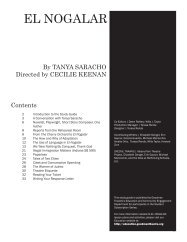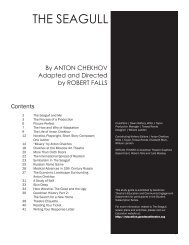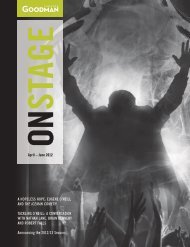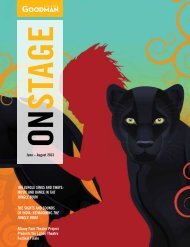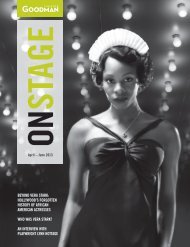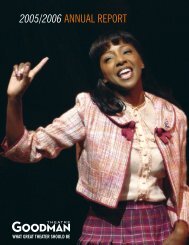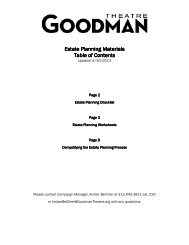Magnolia, atlanta and dr. Martin luther king jr. a ... - Goodman Theatre
Magnolia, atlanta and dr. Martin luther king jr. a ... - Goodman Theatre
Magnolia, atlanta and dr. Martin luther king jr. a ... - Goodman Theatre
You also want an ePaper? Increase the reach of your titles
YUMPU automatically turns print PDFs into web optimized ePapers that Google loves.
Once Upon a Time…<br />
The Story of “Rumpelstiltskin”<br />
By Steve Scott<br />
For Ghostwritten, Naomi Iizuka has<br />
<strong>dr</strong>awn upon a wide variety of influences<br />
<strong>and</strong> sources. Among the most fascinating<br />
is her reference to that most magical<br />
<strong>and</strong> terrifying of folk tales, the story<br />
of “Rumpelstiltskin”:<br />
Once upon a time, there was a poor<br />
miller who had a beautiful daughter.<br />
Wanting to appear more important, the<br />
miller told the <strong>king</strong> that his daughter<br />
could spin straw into gold. The <strong>king</strong><br />
called for the girl <strong>and</strong> told her that she<br />
must do her magical work for three<br />
nights or face execution. Beside herself<br />
with worry, the girl was about to give up<br />
hope when a dwarf appeared, offering to<br />
spin the straw into gold in exchange for<br />
the girl’s necklace, <strong>and</strong> on the second<br />
night, for her ring. On the third night,<br />
left with nothing else to reward the<br />
dwarf, the girl promised to give the dwarf<br />
her firstborn child. He agreed, <strong>and</strong> the<br />
next morning the <strong>king</strong> was so impressed<br />
with the girl’s work that he asked for her<br />
h<strong>and</strong> in marriage.<br />
The next day, the queen told the dwarf<br />
his name. Enraged, Rumpelstiltskin<br />
stomped his foot so hard that he <strong>dr</strong>ove<br />
his entire leg into the ground, then<br />
pulled at his left leg so hard that he<br />
tore himself in two.<br />
A German folktale dating from the mid-<br />
16th century, “Rumpelstiltskin” was<br />
first published by the Brothers Grimm<br />
in the 1812 edition of Chil<strong>dr</strong>en’s <strong>and</strong><br />
Household Tales. After numerous revisions,<br />
the most enduring version (including<br />
the violent fate of the title character)<br />
appeared in 1857. Since then, the story<br />
has been told in dozens of other countries<br />
<strong>and</strong> languages; it has been lauded<br />
as a cautionary fable against bragging,<br />
condemned as evidence of medieval<br />
German anti-Semitism <strong>and</strong> analyzed as<br />
an instructive tale about value of household<br />
skills for young housewives-to-be.<br />
It has even been used to define the modern<br />
psychological syn<strong>dr</strong>ome of superiors<br />
who dem<strong>and</strong> unreasonable efforts from<br />
their workers.<br />
Among the most potent explorations of<br />
the collision between the worlds of magic<br />
<strong>and</strong> reality in all of literature, the myth of<br />
“Rumpelstiltskin” has inspired film <strong>and</strong><br />
<strong>dr</strong>amatic versions, contemporary retellings<br />
(Vivian V<strong>and</strong>e Velde’s young-adult story<br />
collection The Rumpelstiltskin Problem<br />
investigates the story from the dwarf’s<br />
point of view) <strong>and</strong> a raft of psychological<br />
treatises. The story’s depiction of human<br />
greed, an otherworldly figure with both<br />
magical <strong>and</strong> destructive powers <strong>and</strong> the<br />
impending loss of a beloved child strikes<br />
primal chords in all of us, <strong>and</strong> is echoed<br />
to haunting effect in Naomi Iizuka’s<br />
masterful play.<br />
In time, the <strong>king</strong> <strong>and</strong> queen brought a<br />
beautiful baby into the world, <strong>and</strong> the<br />
queen forgot about her promise. But<br />
one night the little man reappeared,<br />
dem<strong>and</strong>ing the child. In desperation,<br />
the queen offered the dwarf all of the<br />
riches of the <strong>king</strong>dom; he refused.<br />
When she broke down in tears, the<br />
dwarf reluctantly agreed that she could<br />
keep her child if she could guess his<br />
name in the span of three days. For two<br />
days she failed; but just before the third<br />
day, the queen’s messenger came upon<br />
the dwarf in the forest, hopping around<br />
his fire <strong>and</strong> singing,<br />
Today do I bake, tomorrow I brew,<br />
The day after that the queen’s child<br />
comes in;<br />
And oh! I am glad that nobody knew<br />
That the name I am called is<br />
Rumpelstiltskin!<br />
Woodcut of “Rumpelstiltskin.”<br />
NEA Brings Ghostwritten to Life<br />
The <strong>Goodman</strong> is pleased to acknowledge<br />
the National Endowment for the Arts as<br />
a sponsor of the world-premiere production<br />
of Naomi Izuka’s Ghostwritten. The<br />
National Endowment for the Arts is a public<br />
agency dedicated to supporting excellence<br />
in the arts, both new <strong>and</strong> established;<br />
bringing the arts to all Americans;<br />
<strong>and</strong> providing leadership in arts education.<br />
Production support from the National<br />
Endowment for the Arts is vital to the<br />
<strong>Goodman</strong>’s ability to present the highest<br />
quality productions of vibrant classics,<br />
richly diverse plays <strong>and</strong> exciting new work<br />
from the country’s finest playwrights.<br />
13



